The Reality of Teaching English in South Korea: What Nobody Tells You
Table of Contents
- Introduction
- Why South Korea?
- Daily challenges
- Cultural difference
- What teachers wish they knew
- Hidden costs
- Social and expat scenes
- What if you want to leave?
- Something you wish you knew
- How has it shaped you?
- Would you recommend Korea?
Depending on your interests, a few things may enter your mind when you hear the name South Korea, and they all start with the letter K: K-pop, kimchi, K-beauty (we’ve all seen those sheet masks popping up in Netflix TV series!).
But these popular trends paint a version of South Korea that won’t hold up against the realities of everyday life in Korea, especially once you’re living and working there as a native English teacher.
Read more: 4 Ways To Live And Work In South Korea
So, before you sign up to teach English in South Korea, let me present the raw version of what it may look like. Keep in mind that everyone’s experiences differ greatly, but this was mine!
My name is Lauren Johnstone. I am TEFL-certified, have a PGCE and am currently pursuing my Bachelor of Education Honours degree in Curriculum Studies. I am 43 years old with just over seven years of experience teaching both teenagers and adults.
Read more: How Do Adults Learn Foreign Languages?
My first teaching experiences were in South Korea, where I worked at two middle schools and an all-girls high school.
I decided to teach abroad for several reasons.
I’ve always wanted to travel and experience new cultures, and teaching English gave me the perfect opportunity to do that. Plus, I wanted to grow professionally, and my previous job didn’t offer much room for advancement.
Did South Korea live up to your expectations?
I’ve always been interested in Asian culture and international travel, but honestly, I didn’t so much decide on South Korea as South Korea chose me.
My mother connected me with someone she knew who was teaching there, and after speaking with that teacher over the phone, my interest was sparked. I was very fortunate in that I knew I would have support once I arrived, which would ease my transition.
Before that, I knew close to nothing about South Korea so I didn’t have any expectations.
My contact connected me with a local recruiter in my city who provided a one-week introduction to South Korea, which helped me learn about South Korean culture
My biggest concern about the job was whether I was capable of doing it since I was introverted and inexperienced. But I figured that since my dad was a lecturer, I may have ‘the teaching gene’. Teaching EFL seemed like a good way to find out.
Spoiler alert: It was!
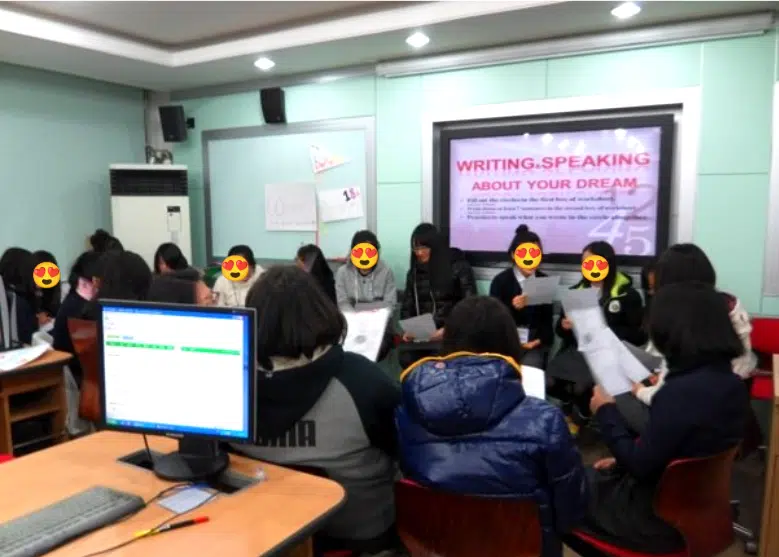
A Winter Camp activity in action
After moving to South Korea, the first thing that surprised me was the landscape. It was drastically different to Cape Town, South Africa, where I’m from.
I expected to see regular houses. Instead, I saw a flattened landscape with a few hills and many high-rise buildings. I found it quite unattractive compared to my home town.
It was a long drive to Dongducheon, a small city near the border with North Korea, where I would be living. It was much smaller than I was used to.
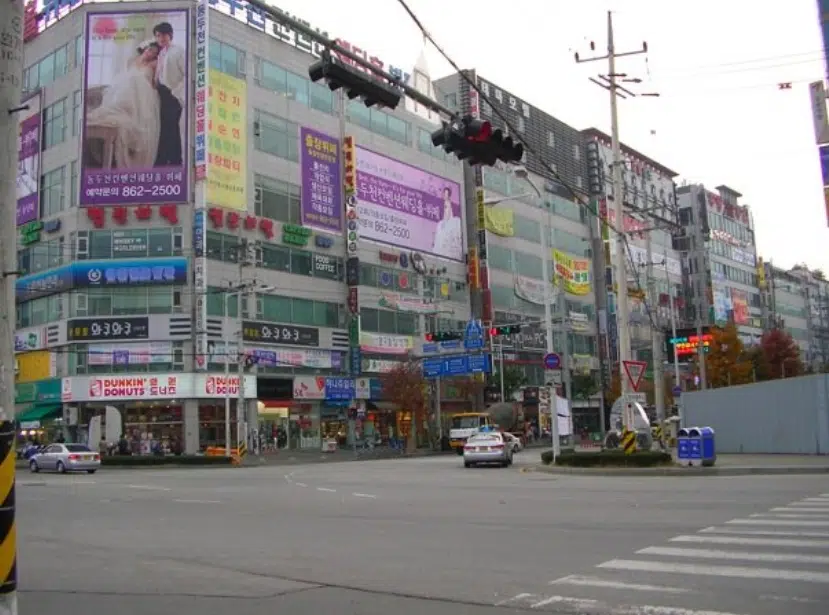
Jihaeng, Dongducheon
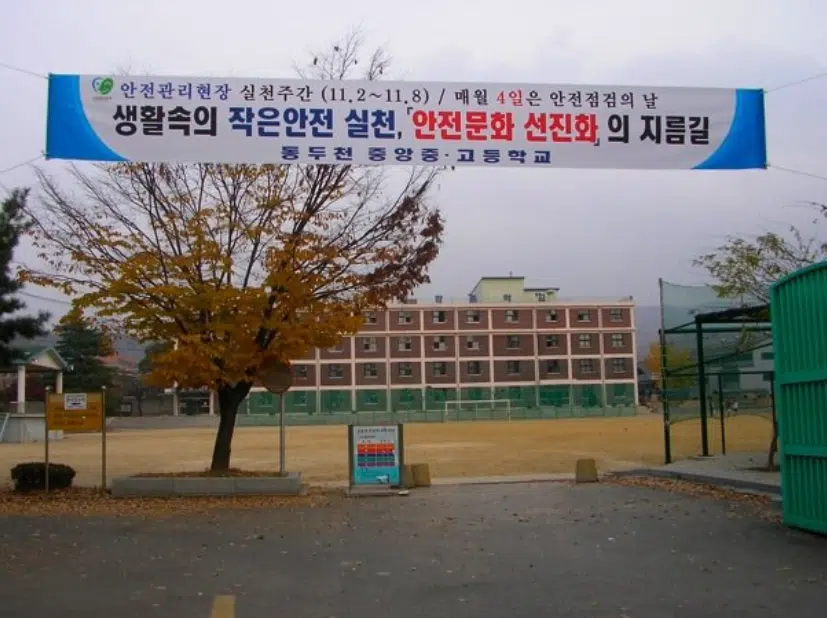
My very first school: Dongducheon Middle School
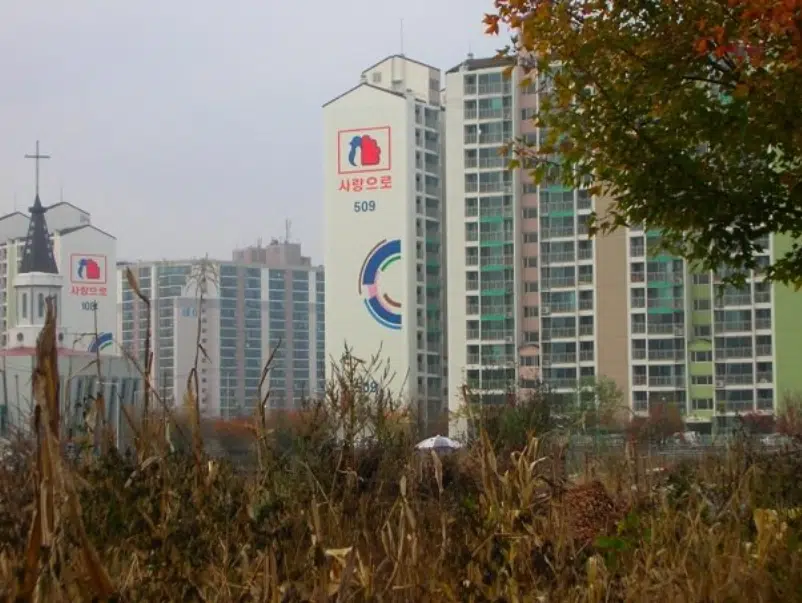
Apartment buildings say 사랑으로 or “with love” just above the building number (I lived in 509.)
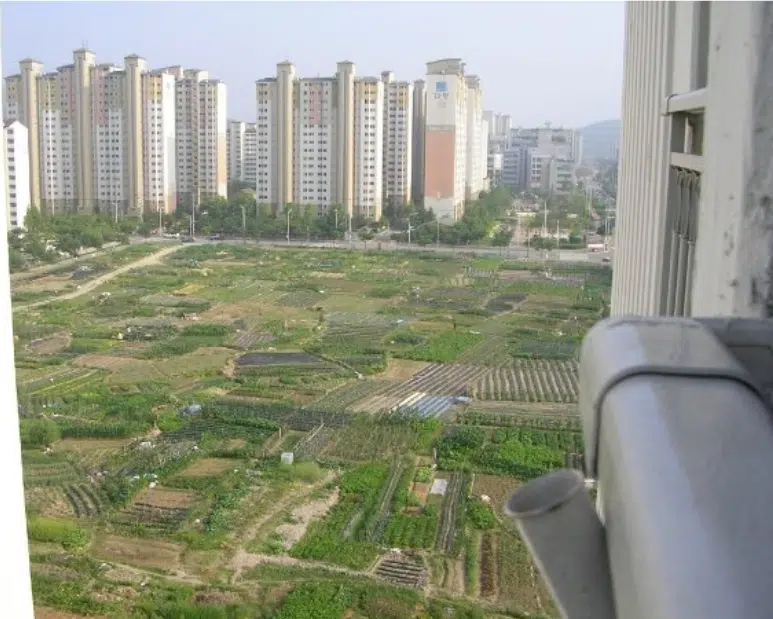
A view from my apartment on the 11th floor
What’s a small daily challenge that took some getting used to?
The smallest things that we often overlook become difficult, like taking out the trash. Recycling was important, and I had to use special plastic bags for food waste that had to be purchased at local corner stores. A security guard at the apartment complex where I stayed was stationed right next to the bins, so throwing out trash was stressful at first, and it was my first time recycling!
Taking the subway the first few times was like figuring out a maze! I didn’t travel alone until I was comfortable. Taking taxis and giving directions in broken Korean to get around was also new, but became second nature after the first few months.
Read more: How Can I Teach English Abroad Without Teaching The Local Language?
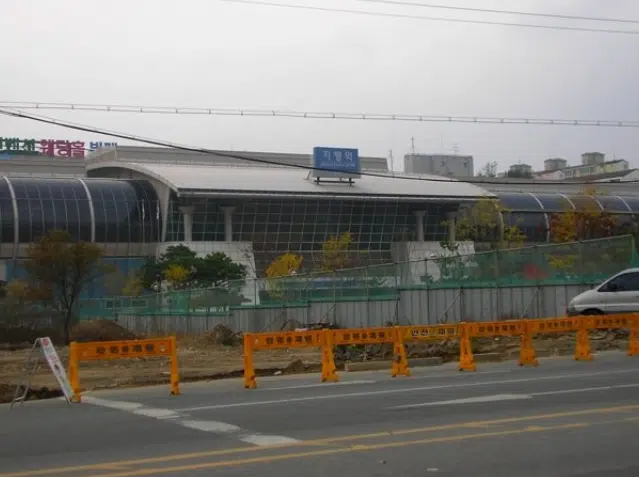
Jihaeng subway station
Another new sight was seeing the US military walking the streets in my neighbourhood. I lived near Camp Casey [a US Army base] in my first year, so this was a regular sight, which I quickly grew accustomed to.
Drawing money at the ATM, where all the keys and instructions were in Korean, or going to the shop, where all the food looked unfamiliar, were all part of the daily challenges.
My mobile SIM card also didn’t work there, so I had to purchase a cheap phone and buy calling cards to phone home.
My main co-teacher (as I always had several) helped me with bureaucracy. She accompanied me for my medical check, setting up a bank account, setting up the internet, and so forth.
Are there any cultural differences or unspoken rules?
Some people wonder, do Koreans like foreigners?
Koreans have a special term for foreigners: waygook. I would hear it when travelling on the subway or maybe in passing, accompanied by inquisitive looks.
Some locals viewed foreigners with suspicion, while others were welcoming, but I never had a problem. Some teachers recounted negative experiences they had with students’ parents, co-teachers, staff or the locals, but not often.
The cultural differences are too numerous to mention. Almost everything was completely different.
An important difference is how those from the West are viewed. Korean society is conservative, so controlling your emotions, dressing a little more conservatively (make that A LOT when at school), and not shouting in public help with how you are perceived.
I never saw women in tank tops as they kept their shoulders covered. I thought it was strange how they would wear tiny shorts exposing their legs, but the top half was always fully clothed. Female teachers must cover their chests. I’ll never forget how I leaned down to assist a student and my co-teacher nearly jumped out of her skin to tell me to be careful – and all you could see was my collarbone!
Read more: Navigating Culture Shock: My Experience Teaching English In Vietnam

At the Seoul 4th World DJ Festival
What should teachers know before coming here?
The culture shock is huge.
It’s not uncommon to hear of teachers leaving within six months of arrival due to this.
One teacher who arrived with us (an older and experienced male teacher) left after only two weeks! The fact that he was not tech-savvy may have played a role, as he seemed to struggle with even the basics.
Patience, an open mind and a genuine interest in Korean culture are key to surviving your first year in Korea.
I think many teachers don’t realise how difficult it would be to buy clothing in their size. It was incredibly difficult, even if you’re slim. The differences in body shape are vast. Larger shoe sizes are also hard to find, so bringing a few pairs from home is a must.
Even though you are told that you’ll have a co-teacher who will always be present while you teach, you are sometimes left alone with the class. This can be difficult when you lack classroom management skills.
Luckily, teachers are well-respected, so even though it was daunting for me, the kids never gave me any problems. In fact, they were lovely.
There’s a lot of miscommunication due to the South Korean indirect style of communication, which often causes frustration for expat teachers who end up feeling confused or even angry.
For example, someone might say “yes” when you make a request, but then nothing ever happens. This is common and usually more about being polite and avoiding confrontation than actually agreeing to the request.
The lifestyle varies depending on whether you find “your tribe,” but for those who do, it’s an exceptionally fun experience that some teachers struggle to balance with work, particularly due to Korea’s massive drinking culture.
Is there a hidden cost that nobody talks about?
For me, everything went smoothly financially as I was good at saving, so I would say the hidden costs are emotional and mental.
The impact of culture shock should not be underestimated.
It took me roughly six months to acclimatise, and I would often have random moments where I would stop, look around and realise, “Oh my gosh, I’m in Korea. This is crazy.” It would happen while doing simple things like crossing the street.
The emotional toll came a few months into my teaching role.
I struggled with lesson planning. No textbook, resources or curriculum were shared with me, so I was teaching blindly, and lessons were often disconnected. I would spend hours (sometimes all day) browsing ESL websites looking for materials.
My Sundays often consisted of me scrolling from the morning around 9 am until as late as 10 pm just trying to piece together lessons to teach the various grades. This, coupled with the everyday realities of daily life in South Korea, was stressful. I thought of resigning, but I had a close friend who encouraged me to stay.
Another emotional cost is the revolving door of friendships.
People are constantly coming and going, which can make it difficult to form lasting connections. It can become very lonely. After a while, you stop wanting to put in the effort. The cycle of meeting new expats excited to do things you’ve already experienced starts to feel monotonous.
How did you find the social or expat scene?
The social scene in Korea is amazing.
I found it exceptionally easy to connect to people and had hundreds of expat teachers in my network — that’s not an exaggeration!
I was lucky that my first school was situated on the same grounds as the high school. There was another expat teacher there who also happened to be South African and who was very helpful. I could walk over any time and visit his office for advice, assistance, or just to vent.
I went to Korea through the GEPIK program (now EPIK), which held a three-day orientation session shortly after arrival. This was one of the primary ways to connect with expats. People often kept in touch and met up later, usually in Itaewon, Seoul — a popular tourist area known for its international restaurants, nightlife, and expat community.

The GEPIK English teacher orientation
I lived in the north of Gyeonggi-do (Gyeonggi province), where I experienced a strong expat community which consisted mainly of North Americans, South Africans and Canadians. As we were based near Camp Casey, we mixed with the US Army as well.
I enjoyed myself too much to notice if anyone was isolated, but I know those based in rural locations struggled more due to social isolation. The attitudes of locals towards foreigners in these parts may have been different from those in Seoul or bigger towns.

Christmas lunch with friends in Dongducheon
Although Dongducheon, where I spent my first year, was a very small town, it had a large expat community, and many of us lived nearby. It made a difference knowing that there were other foreign teachers within reach.

A SAKorNet event for South Africans in South Korea
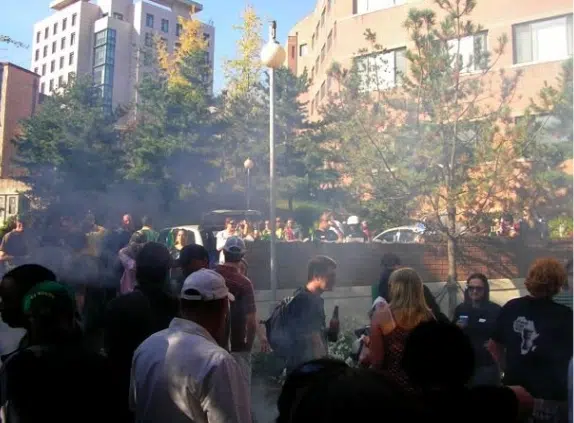
A South African braai organised by SAKorNet

With friends at the 2010 pre-World Cup Braai in South Korea
Did you experience culture shock?
I remember having one moment when I wanted to leave in my first year.
I didn’t enjoy teaching and felt like a fraud. The constant need to create new lessons created anxiety, and a packed teaching schedule worsened the problem.
For an introvert who lacked self-confidence, the stress was immense. On top of that, I had issues with one co-teacher.
What kept me going was the will to complete my contract to prove to myself that I could do it and not fall into a pattern of giving up when things become hard.
I loved socialising with the friends I had made, which also kept me going. Also, I didn’t particularly want to return to South Africa and, outside of teaching challenges, I loved my life in South Korea.

Some of my top English students at Shing Kwang Girls’ High in Namyeong, Seoul, around Halloween
Anything you wish you had known before moving to South Korea?
I definitely would have packed better!
I would have made better use of my spare time by studying further instead of focusing solely on having fun.

A sign outside of my ‘office’ at Songnae Middle School in Dongducheon
Lastly, I would have had a solid plan in place to work toward instead of just winging it. In hindsight, I would have educated myself on financial planning.
How has living and teaching in South Korea shaped you?
The experience was truly life-changing for me.
It showed me that I’m capable of more than I ever realised: resilient, adaptable, able to rise to challenges, navigate tough situations, and more open-minded than I thought.
On a personal level, the change was profound.
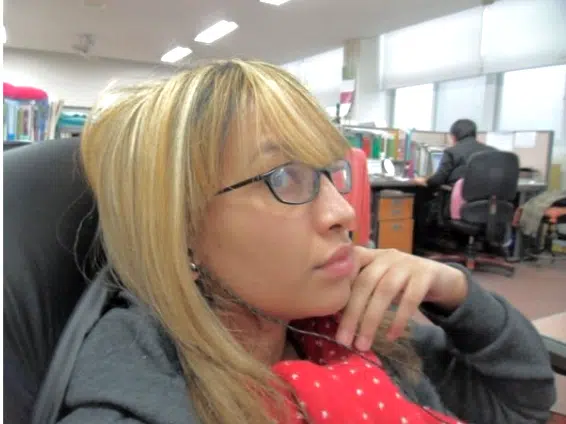
‘Desk-warming’ in the staff room at Shin Kwang Girls’ High School
I also grew professionally. As time went on, teaching became easier, and my skills improved.
The experience opened my mind to the idea of teaching as a long-term career. In fact, it’s very unlikely I would have ever pursued a PGCE if it hadn’t been for my time in Korea.
Another interesting outcome of my time in Korea is that I learned to read Hangeul and did an online language exchange with a Korean local who quickly became a friend. I can still read it to this day despite not practising, which surprises me.
Would you recommend South Korea to TEFL teachers?
It depends on the individual, how open you are to different cultures, ways of working, and navigating challenges, and age. As long as your expectations are realistic, you have a strong support network and strategies to cope with stress and loneliness, you should be fine.
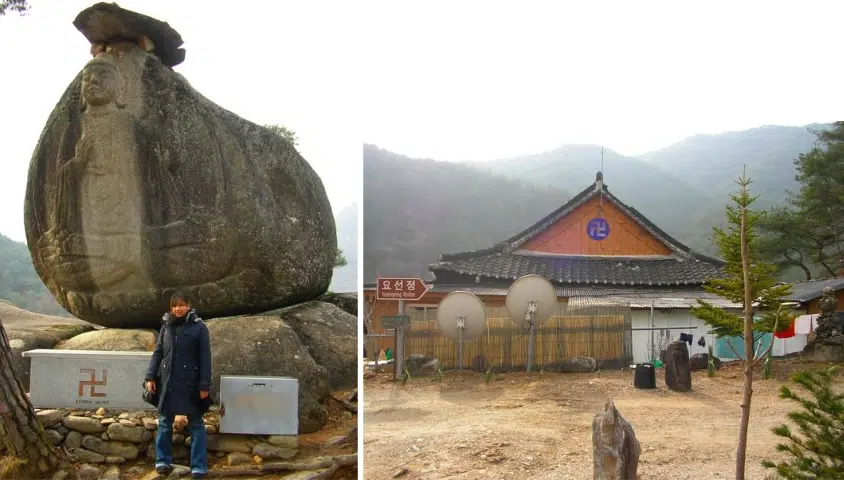
During a templestay
However, I wouldn’t recommend it to everyone.
I would put it down to the following factors: placement, colleagues, school culture, support network, age and life experience, mental toughness and a bit of luck.
Your experience can vary widely depending on the school, location, and how well you adapt to the local work culture.
All in all, I would definitely do it all again. South Korea holds a special place in my heart, and I hope to return there someday.
Table of Contents
- Introduction
- Why South Korea?
- Daily challenges
- Cultural difference
- What teachers wish they knew
- Hidden costs
- Social and expat scenes
- What if you want to leave?
- Something you wish you knew
- How has it shaped you?
- Would you recommend Korea?
Depending on your interests, a few things may enter your mind when you hear the name South Korea, and they all start with the letter K: K-pop, kimchi, K-beauty (we’ve all seen those sheet masks popping up in Netflix TV series!).
But these popular trends paint a version of South Korea that won’t hold up against the realities of everyday life in Korea, especially once you’re living and working there as a native English teacher.
Read more: 4 Ways To Live And Work In South Korea
So, before you sign up to teach English in South Korea, let me present the raw version of what it may look like. Keep in mind that everyone’s experiences differ greatly, but this was mine!
My name is Lauren Johnstone. I am TEFL-certified, have a PGCE and am currently pursuing my Bachelor of Education Honours degree in Curriculum Studies. I am 43 years old with just over seven years of experience teaching both teenagers and adults.
Read more: How Do Adults Learn Foreign Languages?
My first teaching experiences were in South Korea, where I worked at two middle schools and an all-girls high school.
I decided to teach abroad for several reasons.
I’ve always wanted to travel and experience new cultures, and teaching English gave me the perfect opportunity to do that. Plus, I wanted to grow professionally, and my previous job didn’t offer much room for advancement.
Did South Korea live up to your expectations?
I’ve always been interested in Asian culture and international travel, but honestly, I didn’t so much decide on South Korea as South Korea chose me.
My mother connected me with someone she knew who was teaching there, and after speaking with that teacher over the phone, my interest was sparked. I was very fortunate in that I knew I would have support once I arrived, which would ease my transition.
Before that, I knew close to nothing about South Korea so I didn’t have any expectations.
My contact connected me with a local recruiter in my city who provided a one-week introduction to South Korea, which helped me learn about South Korean culture
My biggest concern about the job was whether I was capable of doing it since I was introverted and inexperienced. But I figured that since my dad was a lecturer, I may have ‘the teaching gene’. Teaching EFL seemed like a good way to find out.
Spoiler alert: It was!

A Winter Camp activity in action
After moving to South Korea, the first thing that surprised me was the landscape. It was drastically different to Cape Town, South Africa, where I’m from.
I expected to see regular houses. Instead, I saw a flattened landscape with a few hills and many high-rise buildings. I found it quite unattractive compared to my home town.
It was a long drive to Dongducheon, a small city near the border with North Korea, where I would be living. It was much smaller than I was used to.

Jihaeng, Dongducheon

My very first school: Dongducheon Middle School

Apartment buildings say 사랑으로 or “with love” just above the building number (I lived in 509.)

A view from my apartment on the 11th floor
What’s a small daily challenge that took some getting used to?
The smallest things that we often overlook become difficult, like taking out the trash. Recycling was important, and I had to use special plastic bags for food waste that had to be purchased at local corner stores. A security guard at the apartment complex where I stayed was stationed right next to the bins, so throwing out trash was stressful at first, and it was my first time recycling!
Taking the subway the first few times was like figuring out a maze! I didn’t travel alone until I was comfortable. Taking taxis and giving directions in broken Korean to get around was also new, but became second nature after the first few months.
Read more: How Can I Teach English Abroad Without Teaching The Local Language?

Jihaeng subway station
Another new sight was seeing the US military walking the streets in my neighbourhood. I lived near Camp Casey [a US Army base] in my first year, so this was a regular sight, which I quickly grew accustomed to.
Drawing money at the ATM, where all the keys and instructions were in Korean, or going to the shop, where all the food looked unfamiliar, were all part of the daily challenges.
My mobile SIM card also didn’t work there, so I had to purchase a cheap phone and buy calling cards to phone home.
My main co-teacher (as I always had several) helped me with bureaucracy. She accompanied me for my medical check, setting up a bank account, setting up the internet, and so forth.
Are there any cultural differences or unspoken rules?
Some people wonder, do Koreans like foreigners?
Koreans have a special term for foreigners: waygook. I would hear it when travelling on the subway or maybe in passing, accompanied by inquisitive looks.
Some locals viewed foreigners with suspicion, while others were welcoming, but I never had a problem. Some teachers recounted negative experiences they had with students’ parents, co-teachers, staff or the locals, but not often.
The cultural differences are too numerous to mention. Almost everything was completely different.
An important difference is how those from the West are viewed. Korean society is conservative, so controlling your emotions, dressing a little more conservatively (make that A LOT when at school), and not shouting in public help with how you are perceived.
I never saw women in tank tops as they kept their shoulders covered. I thought it was strange how they would wear tiny shorts exposing their legs, but the top half was always fully clothed. Female teachers must cover their chests. I’ll never forget how I leaned down to assist a student and my co-teacher nearly jumped out of her skin to tell me to be careful – and all you could see was my collarbone!
Read more: Navigating Culture Shock: My Experience Teaching English In Vietnam

At the Seoul 4th World DJ Festival
What should teachers know before coming here?
The culture shock is huge.
It’s not uncommon to hear of teachers leaving within six months of arrival due to this.
One teacher who arrived with us (an older and experienced male teacher) left after only two weeks! The fact that he was not tech-savvy may have played a role, as he seemed to struggle with even the basics.
Patience, an open mind and a genuine interest in Korean culture are key to surviving your first year in Korea.
I think many teachers don’t realise how difficult it would be to buy clothing in their size. It was incredibly difficult, even if you’re slim. The differences in body shape are vast. Larger shoe sizes are also hard to find, so bringing a few pairs from home is a must.
Even though you are told that you’ll have a co-teacher who will always be present while you teach, you are sometimes left alone with the class. This can be difficult when you lack classroom management skills.
Luckily, teachers are well-respected, so even though it was daunting for me, the kids never gave me any problems. In fact, they were lovely.
There’s a lot of miscommunication due to the South Korean indirect style of communication, which often causes frustration for expat teachers who end up feeling confused or even angry.
For example, someone might say “yes” when you make a request, but then nothing ever happens. This is common and usually more about being polite and avoiding confrontation than actually agreeing to the request.
The lifestyle varies depending on whether you find “your tribe,” but for those who do, it’s an exceptionally fun experience that some teachers struggle to balance with work, particularly due to Korea’s massive drinking culture.
Is there a hidden cost that nobody talks about?
For me, everything went smoothly financially as I was good at saving, so I would say the hidden costs are emotional and mental.
The impact of culture shock should not be underestimated.
It took me roughly six months to acclimatise, and I would often have random moments where I would stop, look around and realise, “Oh my gosh, I’m in Korea. This is crazy.” It would happen while doing simple things like crossing the street.
The emotional toll came a few months into my teaching role.
I struggled with lesson planning. No textbook, resources or curriculum were shared with me, so I was teaching blindly, and lessons were often disconnected. I would spend hours (sometimes all day) browsing ESL websites looking for materials.
My Sundays often consisted of me scrolling from the morning around 9 am until as late as 10 pm just trying to piece together lessons to teach the various grades. This, coupled with the everyday realities of daily life in South Korea, was stressful. I thought of resigning, but I had a close friend who encouraged me to stay.
Another emotional cost is the revolving door of friendships.
People are constantly coming and going, which can make it difficult to form lasting connections. It can become very lonely. After a while, you stop wanting to put in the effort. The cycle of meeting new expats excited to do things you’ve already experienced starts to feel monotonous.
How did you find the social or expat scene?
The social scene in Korea is amazing.
I found it exceptionally easy to connect to people and had hundreds of expat teachers in my network — that’s not an exaggeration!
I was lucky that my first school was situated on the same grounds as the high school. There was another expat teacher there who also happened to be South African and who was very helpful. I could walk over any time and visit his office for advice, assistance, or just to vent.
I went to Korea through the GEPIK program (now EPIK), which held a three-day orientation session shortly after arrival. This was one of the primary ways to connect with expats. People often kept in touch and met up later, usually in Itaewon, Seoul — a popular tourist area known for its international restaurants, nightlife, and expat community.

The GEPIK English teacher orientation
I lived in the north of Gyeonggi-do (Gyeonggi province), where I experienced a strong expat community which consisted mainly of North Americans, South Africans and Canadians. As we were based near Camp Casey, we mixed with the US Army as well.
I enjoyed myself too much to notice if anyone was isolated, but I know those based in rural locations struggled more due to social isolation. The attitudes of locals towards foreigners in these parts may have been different from those in Seoul or bigger towns.

Christmas lunch with friends in Dongducheon
Although Dongducheon, where I spent my first year, was a very small town, it had a large expat community, and many of us lived nearby. It made a difference knowing that there were other foreign teachers within reach.

A SAKorNet event for South Africans in South Korea

A South African braai organised by SAKorNet

With friends at the 2010 pre-World Cup Braai in South Korea
Did you experience culture shock?
I remember having one moment when I wanted to leave in my first year.
I didn’t enjoy teaching and felt like a fraud. The constant need to create new lessons created anxiety, and a packed teaching schedule worsened the problem.
For an introvert who lacked self-confidence, the stress was immense. On top of that, I had issues with one co-teacher.
What kept me going was the will to complete my contract to prove to myself that I could do it and not fall into a pattern of giving up when things become hard.
I loved socialising with the friends I had made, which also kept me going. Also, I didn’t particularly want to return to South Africa and, outside of teaching challenges, I loved my life in South Korea.

Some of my top English students at Shing Kwang Girls’ High in Namyeong, Seoul, around Halloween
Anything you wish you had known before moving to South Korea?
I definitely would have packed better!
I would have made better use of my spare time by studying further instead of focusing solely on having fun.

A sign outside of my ‘office’ at Songnae Middle School in Dongducheon
Lastly, I would have had a solid plan in place to work toward instead of just winging it. In hindsight, I would have educated myself on financial planning.
How has living and teaching in South Korea shaped you?
The experience was truly life-changing for me.
It showed me that I’m capable of more than I ever realised: resilient, adaptable, able to rise to challenges, navigate tough situations, and more open-minded than I thought.
On a personal level, the change was profound.

‘Desk-warming’ in the staff room at Shin Kwang Girls’ High School
I also grew professionally. As time went on, teaching became easier, and my skills improved.
The experience opened my mind to the idea of teaching as a long-term career. In fact, it’s very unlikely I would have ever pursued a PGCE if it hadn’t been for my time in Korea.
Another interesting outcome of my time in Korea is that I learned to read Hangeul and did an online language exchange with a Korean local who quickly became a friend. I can still read it to this day despite not practising, which surprises me.
Would you recommend South Korea to TEFL teachers?
It depends on the individual, how open you are to different cultures, ways of working, and navigating challenges, and age. As long as your expectations are realistic, you have a strong support network and strategies to cope with stress and loneliness, you should be fine.

During a templestay
However, I wouldn’t recommend it to everyone.
I would put it down to the following factors: placement, colleagues, school culture, support network, age and life experience, mental toughness and a bit of luck.
Your experience can vary widely depending on the school, location, and how well you adapt to the local work culture.
All in all, I would definitely do it all again. South Korea holds a special place in my heart, and I hope to return there someday.
 United States
US
United States
US








